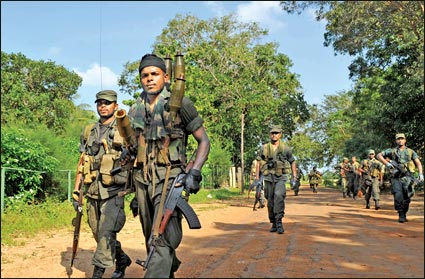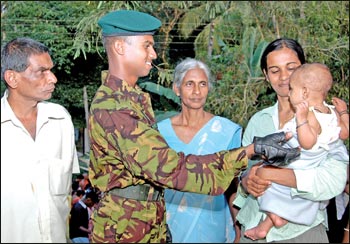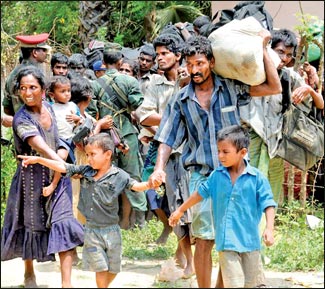|
Widows, orphans and parents:
Care for them who have borne the battle
Lalin Fernando
The contract between the soldier and the state is unique. It is 'You
must do your duty even at the cost of your life. If you should die in
doing so the State will look after your wife and children'. Despite this
in 1983 when 13 soldiers were killed in Jaffna, the Defence Ministry and
the Army did not know how, when and where to bury them. What followed is
history. The conflict has left about 25,000 troops dead, double that
wounded of whom about 10,000 are disabled.
The need to care for those who sacrificed themselves to safeguard our
future became a pressing need and was thereafter well met by successive
governments without exception. There is also a need to look after more
than 100,000 veterans of the three services too, but the priority will
and must be to "care for them who have borne the battle and for their
widows, orphans and parents".
|

Soldiers in the war field. ANCL Library |
Caring for the wounded and the widows, orphans and parents
The government has put into place a host of benefits for the war
wounded and the survivors of the dead, guided over the years by the
three services and their welfare organizations.It is the best we can do
with our meagre resources.
KIA/MIA
When a soldier dies in battle he or she is given a posthumous
promotion and full pay and Widows and Orphans entitlements are paid to
the NOK until the time he or she would have reached 55 years of age.
Thereafter the W&OP only continues to be paid. The same applies to those
who are declared missing in action who if they remain so for over a year
are declared KIA.
WIA
When soldiers are wounded in battle and categorized as unfit for
operational duties, they retained in service, given sedentary duties,
trained in other skills and entitled to full pay and allowances until
they reach the age of 55 when they are retired with a disability
pension.
However if due to disabilities a service person decides as a fighting
soldier that 'the service needs fit people' and leaves the service, he
or she is compensated with a lump sum payment of up to a maximum of Rs.
100,000 according to the percentage of his disability judged by a
medical board of the respective service in addition to the above and
continues to receive full pay until age 55. Thereafter he receives his
disability pension. The war disabled should be economically stable and
psychologically rehabilitated.
Forces Welfare Directorates
These have done sterling work in getting the above pensions approved.
They basically look after the serving soldier but also help retired ones
on a case-by-case basis mainly about pensions and medical facilities.
They help to get land, housing, concessionary rates for goods,
foodstuff, transport and other things and provide distress loans for the
needy, but for the serving soldiers only.
Ranaviru Seva Authority (RVSA)
The Ranaviru Seva Authority was established in 2000 with the
intention primarily of helping soldiers in combat areas so that they did
not need to look backwards to see how their families were doing while
going forward to deal decisively with the LTTE. RVSA has shouldered the
burden of caring for the most affected very well.
The effect of their work can be seen best by the very high levels of
recruitment at the height of the conflict even as the human cost remains
a serious concern. It is important that the politicians and citizenry,
even while building monuments to Service Personnel, do not ever forget
the tremendous sacrifices made by them for the country.
They must remember the unique contract between the soldier and the
State, especially now that the defeat of a fascist megalomaniac and his
thugs who held the country in their thrall for decades is nigh .It is an
opportune moment for a review of the prevailing schemes, facilities and
services care especially for those who made the sacrifices and improve
on them where necessary.
Welfare Schemes
To this end many schemes were launched beginning with building houses
for the next of kin of KIA and for the WIA. One thousand houses were
built in about one year and the aim is to build 50,000 more for all
servicemen. Family-friends schemes, skills development and education of
their children was also taken in hand, There was a database built
islandwide of all widows of KIA and families of WIA and disabled
soldiers.
|

Wives and children waiting for their loved one to come home.
ANCL Library |
A needs assessment was done and problems and issues were prioritized
and action taken. Problems were many including children's schooling,
land, housing, legal, police issues, provision of electricity and water,
receipt of salaries and compensation. Legal luminaries have appeared
free for soldiers and Police in conflict related legal issues.
Scholarships were granted for deserving children.
District committees were organized to get at those affected at
grassroots level. District Secretariats have also been brought in. A
prosthetic plant was set up. Amenities of transit camps for soldiers
going to or returning from combat areas were increased and improved.
Consultants, of whom there is a dearth, are sent to counsel those
affected psychologically including NOK and families.
Commemoration
June 27 was declared Rana Viru Commemoration Day although the Nation
has not been properly briefed how to honour it unlike the anachronistic
WW Commemoration Day in November .A beautiful memorial park was built at
Mylapitiya and another imposing memorial was built on the Parliamentary
grounds.
Organizational change
The RVSA together with the Services Welfare Directorates, guided by
the MOD, provided benefits to those who made the sacrifice. They are
probably as good as those of countries with greater experience of
conflict and financially far more powerful. The value of their combined
efforts could be seen in the morale of the army especially as when it
was decided to do battle, recruitment levels kept rising. Yet soldiers
know as well as others that even as the sacrifices have been immense,
civilian especially political memories remain short. There is more to be
done now as the conflict ends. A more veteran specific organization
should come into force inclusive of the RVSA.
Minister for Veterans' Affairs
It is proposed that we urge the government to appoint a Minister for
Veteran's Affairs at Cabinet level. The Ranaviru Authority will be under
this Ministry, thereby relieving the MOD to concentrate wholly on
defence. The new ministry will assume responsibility for the
administration of veterans' affairs and the enactment of legislation
that will assure welfare for the veterans and their families and
survivors, the payment of disability compensation pensions and the
provision of housing loans, life insurance, vocational rehabilitation,
survivor, medical and burial benefits among other things. Of great
urgency is the enforcement of laws regarding the availability of access
and other facilities in public buildings for the disabled. Arrangements
for the issue of free or half rate tickets and reservation of good seats
for war disabled in public transport should also be made.
Forces Pensions Bureau
Additionally it is recommended that there should be a Bureau for
Veterans' pensions under the Minister instead of the Pensions
Department. The latter has failed to recognize the unique and basic
differences of the contract of the serviceman with that of the State's
civil sector, creating heartburn. It has remained steadfastly impervious
if not also unmoved by the sacrifices made by servicemen in eradicating
the menace that hung over our country for 30 years. It attempts to
calculate military pensions using an 8.30 to 4.30 civil service
template.
The need to recognize the difference is now vital as there has never
been a greater human sacrifice at any moment in our history. The
military's social needs must be looked at sympathetically. Budget
requirements should be worked out accordingly. (Pakistan spent Pak Rs
2323 million in 1992 on benefits (welfare expenses) for exservicemen
using the funds of its famed Fanji Foundation)
Secretary
The Ministry Secretary should be a Major General from the Infantry.
He should also have two Secretaries, preferably officers from the other
two services, covering administration including health and veterans'
benefits. They will be responsible to ensure that the Government policy
for the care of the veterans is implemented effectively. Provincial
Ministries for Veterans Affairs should be appointed to follow through
instructions from the Centre while allocating resources for schemes of
their own especially to help the WIA and the next of kin of the KIA.
|

People who have being displaced because of the war. Picture by:
Rukmal Gamage |
Directors at Tri Service HQs
At present there are directors of welfare at each service HQ but they
are wholly tied up with the welfare of over 200,000 serving personnel.
Therefore separate Directorates dedicated to the administration of
Veterans' welfare at each of the HQs of the three services headed by a
Brigadier or equivalent to implement policies laid down by the Minister
should be set up. These Directors too should be from the combat arms.
Regimental HQs
a. Regimental Veterans' Affairs Officer
Regimental HQs should report to the Director. A major rank officer,
possibly retired, should be the Regimental Veterans Affairs' officer. He
or she will liaise with their own regimental ex-serviceperson's
association and coordinate the requirements of the Veterans from a
dedicated office at RHQ to ensure the policy for caring for Veterans is
implemented effectively at Regimental level. This will mean facilitating
enlistments of those leaving and keeping soldiers aware of the benefits
of joining veterans' associations. WIA should be given free membership.
The veterans' affairs officer should also liaise with the Provincial
Councils concerned to obtain additional benefits for members.
b. District Welfare Officers (DWOs) and Managers
They will function under the Regimental Veterans Affairs Officers and
will be the point of contact with the veterans wherever they live. They
will visit the veterans regularly and report back to their regiments on
the status, (medical, financial, mental etc.) of the Veterans and make
sure that all their requirements if not met are made known to the
Regiment for action. There should be at least one DWO for each district.
They should also liaise with the local authorities to obtain benefits
and concessions for the Veterans.
Regimental and Area Commanders
Area Commanders and Colonels of Regiments should work closely with
the Provincial Governor, Provincial Minister of Veterans Affairs and the
Chief Minister respectively. The latter will initiate the provision of
additional facilities for the veterans like monthly stipends for
decorated war heroes in their province, granting of lands and providing
housing for the WIA and next of kin of KIA including children and
organizing second careers using feedback from the Regimental Veterans'
Affairs Officers and the DWOs.
Resettlement
Many service persons do not have any land of their own outside their
parent's property, which they have to share among several siblings. It
is proposed that in addition to giving houses to serving soldiers as at
present, war wounded veterans and survivors also be included in the
scheme. Provincial Councils will have a prominent part to play here as
they control Government land in their provinces.
Medical facilities
a. General
Few if any WIA service persons or for that matter civilian victim of
bomb attacks who makes it to surgery within six hours of being wounded,
dies. The military casualty evacuation system has played a vital part in
this process. Our doctors and nurses are exceptionally experienced,
efficient and effective and second to none. They have performed
superlatively having been in the high-intensity mode for over 30 years
inclusive of the 2004 tsunami.
The General, Provincial and Teaching Hospitals are today fully
equipped and prepared. Each can take 30 war wounded at any time. The
rehabilitation of the war disabled however is affected by a dearth of
good quality equipment for the limbless starting from crutches, lack of
adequate physiotherapy treatment and also psychological counselling
facilities to counter Post Traumatic Stress Disorder (PTSS).
b. Protocol
There should be a protocol for seriously injured hospital leavers who
should be given the highest priority in receiving all available
facilities. Service medical facilities should be made available, taking
the following factors into consideration, so that those who deserve it
most are given the maximum:
(1) Those who can afford it (eg, officers) should contribute to
veterans' health schemes while for WIA veterans it should be free.
(2) Payment for service-related disabilities (not due to war
injuries) should take into consideration the income and assets of person
and the cost of living.
(3) Comprehensive care and medication, whatever the cost, should be
given free for those who have lost limbs.
(4) Non service-related ailments should be charged. For example for
over 30-day prescriptions and medication.
(5) Dental and Nursing care should be more restricted, giving the WIA
priority.
c. Medical Services
(1) Rehab centres - There should be several military rehabilitation
centres to cope with the number of limbless. The services they offer
should be surveyed periodically. Time spent by individuals should be
monitored according to the status of the WIA in order to offer
occupation to as many people as possible. Only special cases should be
granted six-month long stays. The welfare of the limbless has to be
better coordinated and improved.
(2) OPD clinics should be opened in as many towns as possible so that
they are easily accessed by the majority. Similarly mobile clinics
should visit remote areas on a proper schedule.
(3) Wards and beds in government hospitals should be kept reserved,
especially for injury rehabilitation and mental health care. However
members of the Volunteer Force (VF) with non-service disabilities (ie
not war related or WIA) would not qualify for the above.
(4) Inpatient - There should be sufficient inpatient bed levels for
retired WIA in Veterans' Hospitals. These should be established
beginning within the capital cities of the provinces having the most
veterans needing tertiary medication.
(5) Nursing hospitals - There should be nursing hospitals for the war
disabled pensioners as above.
(6) Volunteer help - Help by voluntary agencies should be encouraged
especially to provide equipment for the limbless like light weight
crutches, socket gel liners for artificial limbs, wheeled commodes and
wheelchairs and counselling rather than items for surgery which are
adequate now.
(7) Invalid children - The scheme should also cover invalid children
of war veterans. It will be only for children of those who fought in the
war.
Education
The department of Veterans' Affairs should run education institutions
in all provincial capitals for the children of the Veterans, giving
priority to NOK of KIA and WIA. Stipends should also be given for
deserving WIA and NOK of KIA to attend schools and universities.
Homes, land and loans
The government is building homes to be purchased by serving soldiers.
Houses or apartments should be given free to the NOK of the war dead and
the war disabled and in places of their choice.
The latter will need special disability fittings in their homes.
Lands are being given in the East similarly and should be extended to
the WIA and NOK of KIA. Generous concessions should be given to widows
of KIA and war disabled when granting loans.
Compensation for WIA
Generous Armed Forces compensations schemes should be given to the
war wounded disabled who opt to leave the service..
Pensions
a. Military pensions
The Forces Pensions must show a distinct difference between war
wounded/affected and regular military pensions. It should be considered
whether there is any merit for a one rank, one pension scheme
irrespective of the date on which a soldier retires, especially for WIA
and NOK of KIA
b. War pensions schemes
War Pensions Committees should be set up in all districts to
adjudicate and administer the grants of disabled ex servicemen and
organize care for widows and neglected children according to their
prevailing situation and not on a one time basis. Provincial councils
should make budgetary provision for servicemen and police in their
provinces accordingly.
(1) War widows pensions should be higher than service widows (normal
death).
(2) Compensation for war wounded and war disabled people should be
generous. (UK gives a maximum of Rs 9 million equivalent plus pension).
Burials
Burials are generally under control.
Vocational rehabilitation and employment
Vocational training schemes of 6 months should be re- introduced for
all leavers.
Priority to and reservations for veterans seeking government jobs
should be given, with relaxation of education and age qualifications and
years in military/police service taken into consideration at placement.
Security agencies should have 50 percent servicemen/ police in their
ranks. Hospitals and government departments, corporations and banks
should be made to insist on 50 percent of all private security personnel
being veterans.
Technical training centres should be set up to teach skills to
veterans and their children.
Life Insurance
There should be a life insurance scheme for all servicemen extending
into the period of retirement up to the age of 65, by which time
hopefully the obligations of parents to their children would have ended.
War widows and NOK
War orphans should be given priority for entry into schools.
Vocational training centres with various skills learning including
computers, secretarial, tailoring, embroidery and knitting should be
established for the above.
Unmarried daughters of KIA and WIA (disabled) should be included in
above.
Sons under the age of 18 of KIA and WIA (disabled) should be offered
leadership training projects.
Divorced and subsequently unmarried wives should receive W & OP
consequent to the death of the serviceman and not the second wife. |



